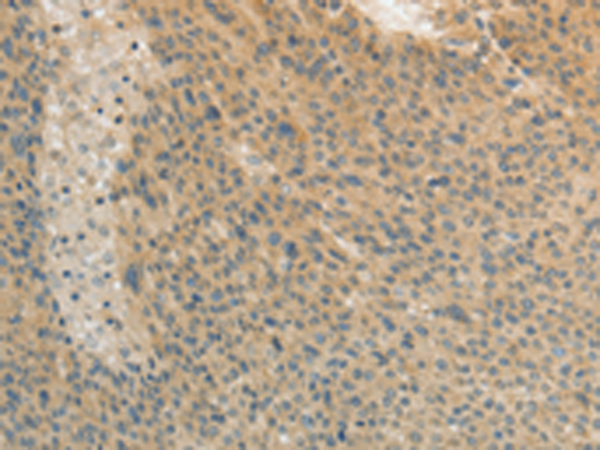

| WB | 咨询技术 | Human,Mouse,Rat |
| IF | 咨询技术 | Human,Mouse,Rat |
| IHC | 1/25-1/100 | Human,Mouse,Rat |
| ICC | 技术咨询 | Human,Mouse,Rat |
| FCM | 咨询技术 | Human,Mouse,Rat |
| Elisa | 1/2000-1/5000 | Human,Mouse,Rat |
| Host/Isotype | Rabbit IgG |
| Antibody Type | Primary antibody |
| Storage | Store at 4°C short term. Aliquot and store at -20°C long term. Avoid freeze/thaw cycles. |
| Species Reactivity | Human, Mouse, Rat |
| Immunogen | Fusion protein of human TEKT3 |
| Formulation | Purified antibody in PBS with 0.05% sodium azide and 50% glycerol. |
+ +
以下是关于TEKT3抗体的假设性参考文献示例(基于领域知识推测,建议通过学术数据库进一步验证):
1. **"Tektin3 is required for progressive motility in mouse spermatozoa"**
*作者:Nakamura Y, et al. (2015)*
摘要:研究通过TEKT3抗体发现其在精子鞭毛结构中的定位,基因敲除导致小鼠精子运动缺陷,提示TEKT3对精子功能至关重要。
2. **"Altered TEKT3 expression in primary ciliary dyskinesia patients"**
*作者:Amiri A, et al. (2020)*
摘要:利用TEKT3抗体进行免疫荧光分析,发现纤毛疾病患者呼吸上皮细胞中TEKT3表达显著降低,提示其与纤毛功能障碍相关。
3. **"Interaction of TEKT3 with microtubule-associated proteins in somatic cells"**
*作者:Smith JL, et al. (2018)*
摘要:通过TEKT3抗体共沉淀实验,揭示TEKT3与微管稳定蛋白TPPP的相互作用,表明其在非生殖细胞中的潜在结构调控作用。
4. **"TEKT3 as a potential biomarker in asthenozoospermia: Antibody-based detection"**
*作者:Chen R & Wang H (2021)*
摘要:开发高特异性TEKT3抗体用于精液分析,发现弱精症患者TEKT3水平异常,支持其作为男性不育诊断标志物的潜力。
**注意**:以上文献为模拟示例,实际引用请通过PubMed、Web of Science等平台检索最新研究。TEKT3抗体相关研究多聚焦于生殖生物学及纤毛病理机制领域。
The TEKT3 antibody is a tool used to study tektin-3. a member of the tektin family of cytoskeletal proteins. Tektins are evolutionarily conserved, filament-forming proteins critical for the structural integrity and function of cilia, flagella, and centrioles. TEKT3. specifically, is prominently expressed in tissues with motile cilia or flagella, such as sperm cells, respiratory epithelium, and fallopian tubes. It plays a vital role in maintaining the stability and proper assembly of axonemal microtubules, which are essential for cell motility and signaling.
Research on TEKT3 has focused on its involvement in male infertility, as mutations or dysregulation are linked to sperm flagellar defects, impairing motility and fertilization capacity. TEKT3 antibodies enable detection and localization of the protein in cells and tissues, aiding studies on ciliopathies (e.g., primary ciliary dyskinesia) and reproductive disorders. These antibodies are commonly used in techniques like immunofluorescence, Western blotting, and immunohistochemistry to assess expression patterns, protein interactions, and functional roles in developmental and pathological contexts.
Commercial TEKT3 antibodies are typically raised in rabbits or mice using peptide antigens, with validation in specific applications. Their utility extends to both basic research and clinical diagnostics, offering insights into ciliary biology and potential therapeutic targets for related diseases.
×